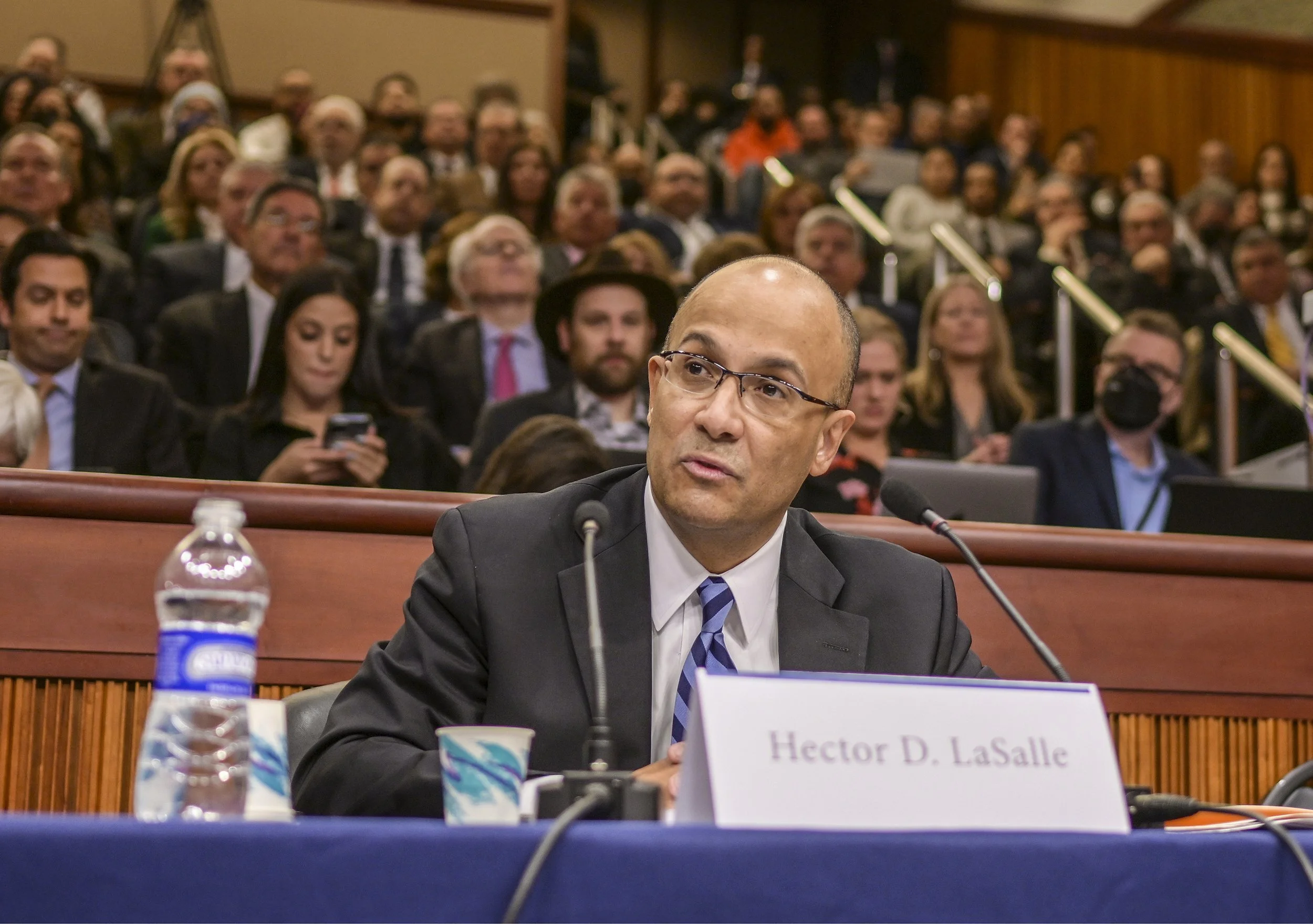Advocacy group calls for end to ‘rubber stamping’ judges to new terms
/The Center for Community Alternatives has called on Governor Kathy Hochul and lawmakers to take a judicial nominee’s record into account when considering whether or not they deserve a second term on the bench. The group, which led the campaign against Hochul’s chief judge pick last year, argues judges are often shuffled through without any scrutiny of their record. File photo by Mike Groll/Office of Governor Kathy Hochul
By Jacob Kaye
A little more than a year after successfully lobbying the State Senate to reject the governor’s chief judge nominee for the first time in history, the advocacy group behind the push is calling on the governor and state lawmakers to more closely scrutinize judicial appointments and nominations for judicial openings across the state.
The Center for Community Alternatives, the group behind the campaign dubbed The Court New York Deserves, launched the next phase of its campaign this week, moving beyond the state’s highest court and into its lower ones.
There, the group says that all too often, termed judicial appointments are treated as lifetime appointments.
Peter Martin, Center for Community Alternatives’ director of judicial accountability, said that judges seeking reappointment, re-nomination or reelection are more often than not given the OK by those in power without much of a second look, regardless of their performance on the bench.
“Our goal is to continue engaging constructively in the judicial selection process to courts across New York State and to make sure that our judges are fit for the bench and upholding their ethical responsibilities and the values that New Yorkers want to see the court system uphold,” Martin said.
“Judges’ terms should mean something,” Martin added. “Judges in New York are not given life tenure, and a status quo in which when someone is put on the bench, they can stay there as long as they want without any evaluation or external scrutiny is a status quo that needs to end.”
To that end, The Court New York Deserves has begun to specifically lobby against the reappointment of one Brooklyn judge they say “has a long record of cruelty and impropriety on the bench,” the group’s website reads.
The group has begun to call on Governor Kathy Hochul to deny Court of Claims Judge Vincent Del Giudice any additional time on the bench. Del Giudice, who currently serves as an acting Supreme Court justice in Brooklyn, has been on the bench for over 20 years and though his term technically expired in December 2022, he continues to serve as a judge.
Del Giudice will hit his mandatory retirement age at the end of the year, at which point he can apply with the court system for certification, which, if granted, will allow him to serve an additional two years.
But the group says that Hochul and lawmakers should take a closer look at Del Giudice and ensure his time on the bench comes to a close.
According to a recent analysis conducted by advocacy group Scrutinize, the Appellate Division, Second Department has found on 19 different occasions that Del Giudice issued an excessive sentence.
In all, the appeals court has reduced over 500 years of sentencing handed down by the Brooklyn judge.
In one of those cases, Del Giudice accepted a 25 years to life sentence plea from a 20-year-old defendant. After giving the plea, the defendant failed two plea conditions – he missed a rescheduled court date without prior notice and admitted guilt but claimed the victims had threatened him. As a result of the violations, Del Giudice doubled the defendant's sentence.
A panel of judges on the Appellate Division, Second Department later overturned Del Giudice’s decision, reducing the sentence to its original term.
“We demand that Governor Hochul not reward Justice Del Giudice with any more time on the bench and instead immediately nominate a new judge to replace him,” The Court New York Deserves said on its website.
The group that led the campaign against the chief judge nomination of Hector LaSalle has now turned its attention to the state’s lower courts, calling for an end to the pro forma process for re-nominating judges. AP file photo by Hans Pennink
“Accountability for the harshest, most unfit judges in New York is only a first step toward a court system that delivers equal justice for all New Yorkers,” they added. “Far more will remain to be done. But this first step forward is critical.”
Avi Small, a spokesperson for Hochul, said, “As she has done since taking office, Governor Hochul will select judicial nominees based on their experience, qualifications and judicial temperament.”
The last time the Court New York Deserves fought a judicial nomination, it won.
The group was the leading voice against Hochul’s nomination of Hector LaSalle for chief judge, a nomination she made in the final days of 2022, several months after former Chief Judge Janet DiFiore had stepped down from the state’s top judicial post.
The group said that it was alarmed by a number of past judicial decisions LaSalle made from the bench, including decisions they claimed took anti-abortion and anti-labor positions. Additionally, they said they were concerned that LaSalle would continue in the conservative tradition started by DiFiore.
A number of State Senators soon joined their cause.
Around a week after Hochul made the nomination, a dozen senators had come out and announced that they would vote against confirming LaSalle if his nomination made it to the floor of the Senate, many of them citing the cases identified by the Court New York Deserves.
After a prolonged battle over the nomination – which nearly led to a constitutional crisis – LaSalle was rejected 39-20 by the full Senate in February 2023.
Following the rejection, Hochul nominated then-Court of Appeals Judge Rowan Wilson, who was considered by many to be one of the most progressive jurists on the state’s top court. Wilson, whose nomination was supported by the advocacy group, was approved by the Senate shortly after his nomination.
LaSalle’s nomination was considered to be one of the most closely watched judicial nominations in the state’s history. Additionally, it’s believed to have generated the most lobbying spending of any judicial nomination in the history of New York.
Martin said the group’s advocacy work played a big role in bringing attention to the nomination and that they learned a number of lessons – “some of them about the state of the judiciary, some of them about the benefits of public engagement and the challenges to the advocacy we were trying to do” – about the advocacy work.
“We came out of that very interested in engaging with the selection processes for courts besides the Court of Appeals,” Martin said of the new campaign. “We became well aware…of how difficult it is for members of the public to learn about who is currently sitting on the bench when judges’ terms are up, who the authorities are, who will potentially reappoint or re-nominate judges for new terms.”
“We were very interested in shedding light on any of those areas,” he added.
Though the Center for Community Alternatives was accused in the past of politicizing the judicial nomination process, Martin said the nomination process is inherently political.
“It's one political process or another,” he said. “What we are doing that's new is not politicizing judicial selection, we are bringing the public into judicial selection in a way that has not been done before.”
“We're proud of that and we think our courts will benefit from more of that,” Martin added.





